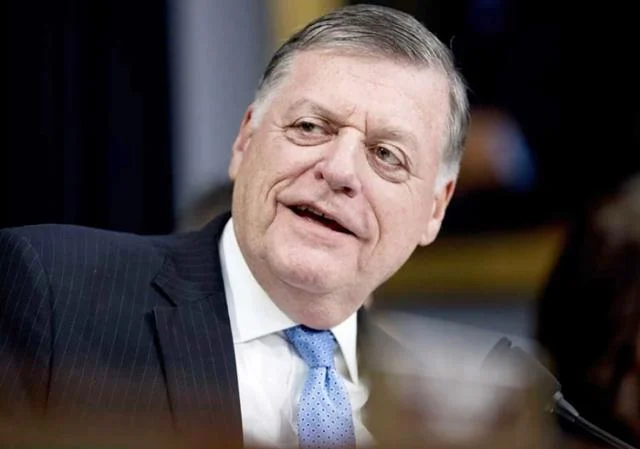WASHINGTON — Recently, a bipartisan group of federal lawmakers announced their introduction of legislation intended to add some reinforcement to the Indian Child Welfare Act.

The “Strengthening Tribal Families Act of 2024” would require the Department of Health and Human Services to create a technical assistance plan using six metrics of data to assess the strengths and weaknesses of states’ implementation plans of the Indian Child Welfare Act.
[Editor's Note: This article first appeared in the Cherokee Phoenix. Used with permission. All rights reserved.]
The measure was introduced to the U.S. House of Representatives by Rep. Don Bacon, R-Nebraska, along with Reps. Judy Chu, D-California; Tom Cole, R-Oklahoma; Sharice Davids, D-Kansas; and Dan Kildee, D-Missouri.
Sen. Tammy Baldwin, D-Wisconsin, will introduce the legislation in the U.S. Senate.
“The Indian Child Welfare Act protects vulnerable Native American children from being taken from their tribal communities and culture during custody or guardianship proceedings,” Cole said. “However, due to such a high rate of Indian children entering into our foster care system, ICWA is not enough. I am proud to have partnered with Congressman Bacon, Congresswoman Chu, Congresswoman Davids, Congressman Schweikert and Congressman Kildee to lead the Strengthening Tribal Families Act of 2024, which will strengthen ICWA protections and ensure Native American children remain in their own communities.”
Congress passed ICWA in 1978 to address the high rate of Native children being removed from their homes and separated from families. The ICWA established federal standards for the removal of Native American children from their homes while prioritizing placement in homes with their Indian culture. ICWA also sets federal requirements for state child abuse and adoption cases for Native children.
In June 2023, the ICWA received a boost when it was ruled constitutional by the U.S. Supreme Court with a 7-2 decision in Halaand v. Brackeen.
“Brackeen was a landmark decision and a major victory for Native tribes, children and the future of our culture and heritage,” Cherokee Nation Principal Chief Chuck Hoskin Jr. said. “But more needs to be done to strengthen the Indian Child Welfare Act and protect the law from future attacks. I applaud Reps. Bacon, Chu, Cole, Davids and Kildee for introducing this important legislation, and Sen. Baldwin for carrying this effort in the Senate. Cherokee Nation supports this bill and will advocate for its passage.”
The implementation of ICWA continues to vary between states and Native tribal interests. Estimates have suggested Native American children are 2.5 times more likely to enter the foster care system than non-Native children. This bill is intended to allow HHS to be able to provide states with evidence-based assistance to improve their plans for implementation of ICWA.
“The Strengthening Tribal Families Act of 2024 will help states improve their compliance with ICWA, which will help more Indian children remain within their tribal culture,” Bacon said. “With Indian children disproportionately represented in the foster care system, this bill will help us achieve better outcomes for Indian children. Research shows us kinship placement helps children develop a stronger attachment to their extended family and culture.”
Chu cited the “unfinished work” of helping Native children who enter the foster care be placed with homes that have a familiar culture.
“I’m leading the Strengthening Tribal Families Act of 2024 … so we can assist state child welfare agencies in implementing those critical ICWA federal protections for tribal children,” Chu said. “By strengthening the relationships between these agencies and the courts and comprehensively analyzing data supplied to HHS by states at regular intervals, the federal government can secure better outcomes for tribal children everywhere and support Indian Country.”
Help us defend tribal sovereignty.
At Native News Online, our mission is rooted in telling the stories that strengthen sovereignty and uplift Indigenous voices — not just at year’s end, but every single day.
Because of your generosity last year, we were able to keep our reporters on the ground in tribal communities, at national gatherings and in the halls of Congress — covering the issues that matter most to Indian Country: sovereignty, culture, education, health and economic opportunity.
That support sustained us through a tough year in 2025. Now, as we look to the year ahead, we need your help right now to ensure warrior journalism remains strong — reporting that defends tribal sovereignty, amplifies Native truth, and holds power accountable.
 The stakes couldn't be higher. Your support keeps Native voices heard, Native stories told and Native sovereignty defended.
The stakes couldn't be higher. Your support keeps Native voices heard, Native stories told and Native sovereignty defended.
Stand with Warrior Journalism today.
Levi Rickert (Potawatomi), Editor & Publisher

